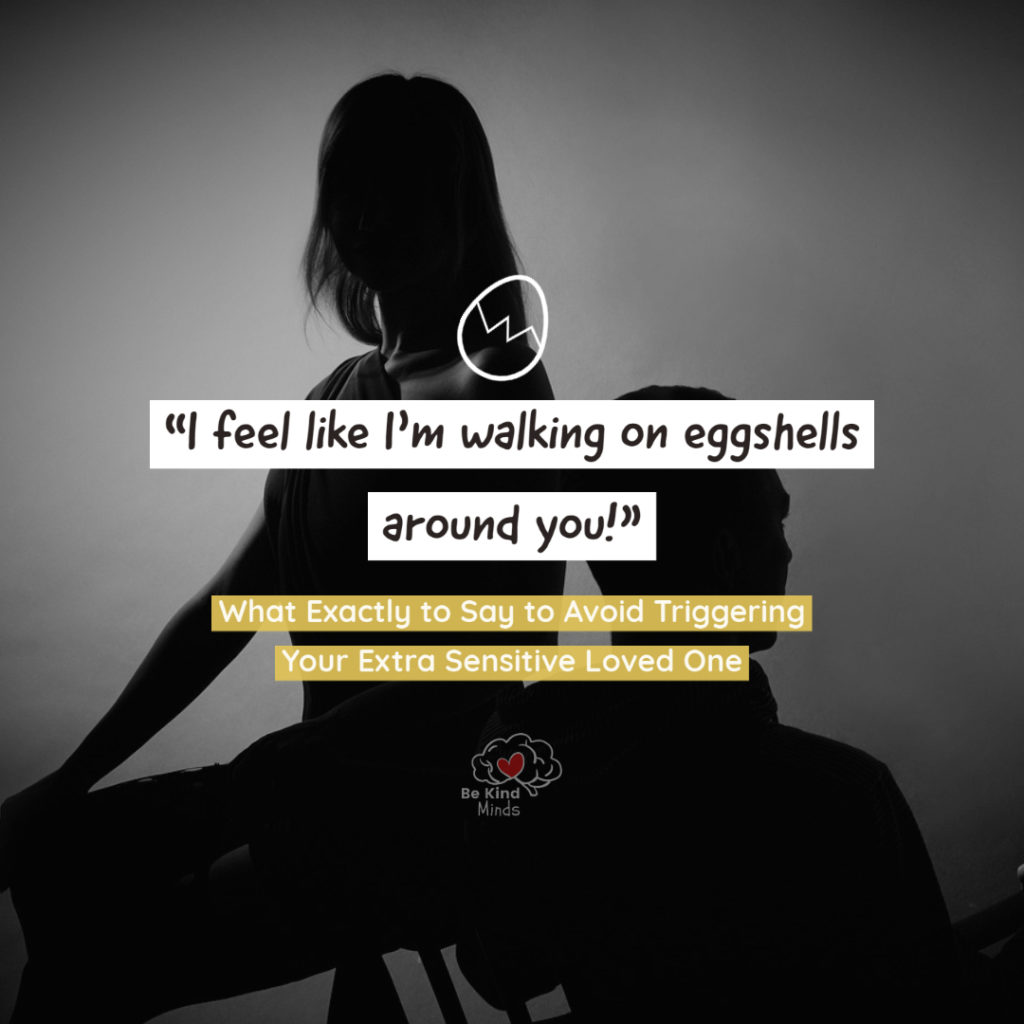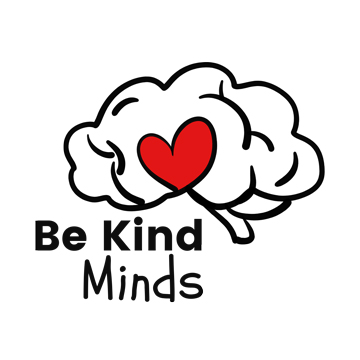Have you ever felt stuck in a relationship with someone you care about, not understanding how to get through to them that you really do care whilst avoiding an emotional whiplash?
Does it always feel like you say the wrong thing, or react the wrong way when you try to have a conversation with them?

Sometimes the easiest solution is to avoid talking or interacting with them… in some instances that can be the wiser thing to do if you’re feeling frustrated… as the Disney character Thumper said, “If you can’t say something nice, don’t say nothing at all.”
But if you’re in a committed relationship, or this person is very close to you, always avoiding a conversation with them can be detrimental to your relationship.

It’s understandable that you’d be nervous talking to them if you have a history of setting them off into an adult-size tantrum or emotional meltdown by simply saying the wrong word, or using the wrong tone of voice. That’s what brings on the feeling of walking on eggshells! I don’t blame you at all for feeling hesitant – I would too!
I’d like to provide some helpful suggestions on how to avoid those reactions and help you reach a successful outcome in your conversations with those you do care about.
Understanding Why They’re Extra Sensitive
First, it helps a great deal to understand the why behind their behavior. This helps draw a sense of compassion within you as you approach them to interact. Because you do want to feel loving towards them, right? Of course, you do. 🙂
Please know that their reaction doesn’t mean they hate you, they likely struggle with emotional dysregulation and after losing control of their emotions, they internalize that interaction and struggle to find compassion for themselves; as they do recognize they didn’t maintain control of themselves when they reacted.
“Emotional dysregulation is a term used to describe an emotional response that is poorly regulated and does not fall within the traditionally accepted range of emotional reaction. It may also be referred to as marked fluctuation of mood, mood swings, or labile mood.”
– WebMD
Brain Conditions That Struggle With Emotional Dysregulation
- Borderline Personality Disorder
- Bipolar Disorder
- ADHD (Attention Deficit Hyperactivity Disorder)
- ASD (Autism Spectrum Disorder)
- CPTSD (complex post-traumatic stress disorder)
Dr. Daniel Amen’s work in brain scanning can show us a visual illustration of why these brain conditions manifest these types of difficult to understand emotional reactions:


“SPECT (single photon emission computed tomography) is a nuclear medicine study that evaluates blood flow and activity in the brain. Basically, it shows three things: healthy activity, too little activity, or too much activity. The healthy surface brain SPECT scan on the left shows full, even symmetrical activity. The ADD scan on the right, taken during concentration, reveals decreased blood flow and activity (the areas that look like “holes”) in the brain’s prefrontal cortex.”
– Dr. Daniel Amen, MD


“SPECT (single photon emission computed tomography) is a nuclear medicine study that evaluates blood flow and activity in the brain. Basically, it shows three things: healthy activity, too little activity, or too much activity. A healthy “active” scan shows the most active parts of the brain with blue representing the average activity and red (or sometimes red and white) representing the most active parts of the brain. In the healthy scan on the left, the most active area is in the cerebellum, at the back/bottom part of the brain. In the PTSD scan (right), a diamond pattern of increased activity is evident in the deep emotional part of the brain.”
– Dr. Daniel Amen, MD
Brains Function Differently in People With Brain Health Conditions
As Dr. Daniel Amen has proven with the studies of thousands of brain scans from patients he and his colleagues have treated that there is a very valid reason why many of us see and experience the world differently, and react to each other differently. This helps us understand the why behind the behavior… too much or too little activity in certain areas of the brain.
- Impulsivity issues are often associated with low activity in the prefrontal cortex (the part of the brain involved with focus, forethought, judgment, organization, planning, impulse control, empathy, and learning from mistakes)
- Compulsive tendencies are usually due to high activity in the anterior cingulate gyrus (a structure involved with error detection and shifting attention)
- Irritability and memory issues are typically linked to abnormal activity in the temporal lobes (an area involved in mood stability, emotional reactions, temper control, learning, moving memories into long-term storage, and auditory processing)
- Negativity is often associated with an overactive limbic system (the part of the brain that colors our emotions and is involved with emotions, bonding, nesting, feeding, and sexuality)
- Nervousness is generally due to increased activity in the basal ganglia (a region involved with motivation, pleasure, and smoothing motor movements)
While those who have healthier brains can react to frustration or confusion in a much more mild way, it makes more sense that those who have areas of the brain that lack activity or blood flow, or have an overabundance of activity in those regions would have a greater struggle in maintaining clarity & control over their emotional reactions. Also, if your loved one comes to you for reassurance repeatedly, and you know that you’ve told them “it’s OK, you’re OK, why do you keep asking?” it would likely be due to issues in memory & long-term storage (also referred to in this case, in the Mental Health community, as Object Constancy & Emotional Permanence).
With this in mind, we can draw out that compassion within us as we work to understand how to effectively communicate with our loved ones to help deliver the message we want them to receive. That we do care, we do want to help, and we do want to feel closer to them, and for them to feel more comfortable talking and interacting with us.
Sympathy vs Empathy

The first rule when conversing with an emotionally overwhelmed person is to avoid trying to fix it for them… they just need to have someone to listen to them, unless of course, they specifically ask you for advice and invite you to offer help.
The easiest response to an emotionally overwhelmed person is to let them know that you care about them and that you love them and miss them. These sentiments help remind them that you care. With a little more effort, you can take it a step further and help them feel heard and understood.
Sympathy Looks & Sounds Like…
- That has to be so difficult, I’m sorry you have to go through that…
- I wish I could take this pain away from you…
- I’m sorry that life is so difficult right now for you, I wish I could make it easier for you…
- That sounds really challenging…
- I wish I had the answers…
- I wish I understood how to help…
- My thoughts are with you…
- I just want you to know that I’m thinking of you…
- I just want you to know that I love you…
- I miss you…
Empathy Looks & Sounds Like…

- I can see that you’re trying your very best. I noticed that you’ve been studying really hard, practicing what you’re learning, and I can see that you’re trying. I can imagine at times it must feel like you’re giving everything you have. I want to remind you that I see your efforts, and your choosing to not give up takes great strength and courage. Your very best will always be enough.
- I can imagine that it must feel overwhelming at times…
- I can see that you are trying, I noticed the good that you have been doing_________.
- I know you’ve been having a difficult time, I just wanted to let you know_______, and you’re invited if you feel comfortable joining us. No pressure to respond, just letting you know about what’s happening and that we’re thinking of you.
- It sounds like you may be feeling hurt. I would like to understand what it is I may have said that hurt your feelings, and how I can avoid using those words in the future. Would you feel comfortable letting me know how I can help you feel safe and understood when talking about how we both feel? Are there specific words or phrases that trigger you?
- When that happened to you, did it feel like something was wrong with you?
- When you hear the word, or when you’re surrounded by… does it feel overwhelming in a confusing way?
- I would feel the same way if I were in that same position…
- I don’t blame you for feeling that way, I would feel that way too…
- That’s a lot to take on, I bet that must feel like a lot to manage emotionally, and physically…
- I hear in your words that you may be feeling overwhelmed, is that right?
- You are a strong person, but sometimes being strong can feel exhausting…
- I can see that we’re not hearing each other in the way we probably want… I would like us to both understand where each of us is coming from, it’s important. Would you feel comfortable taking a break and we revisit this conversation when we both have clearer minds? I do care about how you feel, and I think we can come to at least a compromise in understanding what’s most important to each of us.
- I think I can relate* to what you’re saying… when you do…[or hear]… does it feel like____________?
*Example of relating, which is the hallmark of empathy, sharing in the same feelings in a tangible way:
My husband and I were driving in the car the other day talking about how to communicate effectively to help someone else feel heard and understood. He practiced this with me and said:
“Becky, when we get together in big family gatherings, does it feel like how I feel when I am invited to get together with a bunch of men to play basketball at the chapel? Because I feel like something is wrong with me – that I’m expected to enjoy basketball because I’m a guy— who’s supposed to like sports. I want to make friends, and I want to have fun… but I honestly don’t enjoy sports, and that makes me feel small and stupid, like something must be wrong with me.”
I responded (and yes, feeling heard and my feelings validated because he was absolutely spot on!):
“Exactly! That’s exactly how I feel. Because I am surrounded by people who I LOVE and want to feel close to, but the large crowd of people overwhelms me. I don’t understand how to be around so many people at once, and it feels claustrophobic… I hate that I feel that way, and wish I felt more comfortable. It does make me feel like something is wrong with me, and I feel very ashamed that I don’t like the way I feel when I’m at these special events.”
Why Empathy Works

Sympathy is useful when wanting to help remind someone that you care. Empathy is useful when you want to help someone feel understood and emotionally safe. Empathy can be a very powerful tool in helping someone in their healing journey, and assist them in building confidence.
Empathy makes use of most of our senses: Looks like… Sounds like… Feels like…
We all want to be seen for who we are, and loved. When someone knows that their emotional needs will not go unnoticed by another person they feel more secure in sharing those feelings with them because there is no question as to whether or not you can relate on an intimate level because of how well your thoughts mirror theirs! The usage of these terms helps create a bond between two people which creates security when connecting at an empathetic level; thus making one successful during interactions regarding helping others out emotionally.
If you found this article helpful, please share this with your friends & family if you feel they could benefit from reading these helpful tips! 🙂 Thanks! 💚

